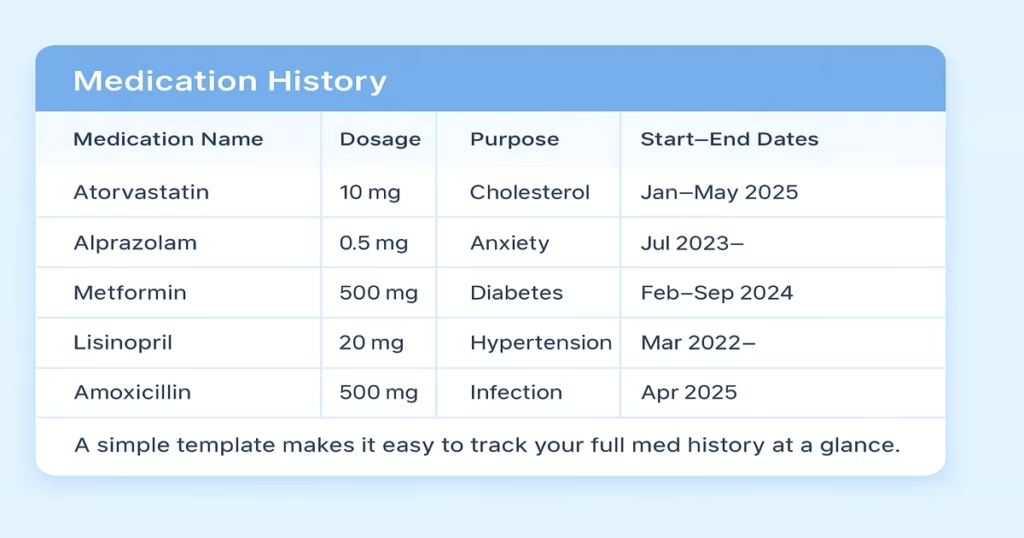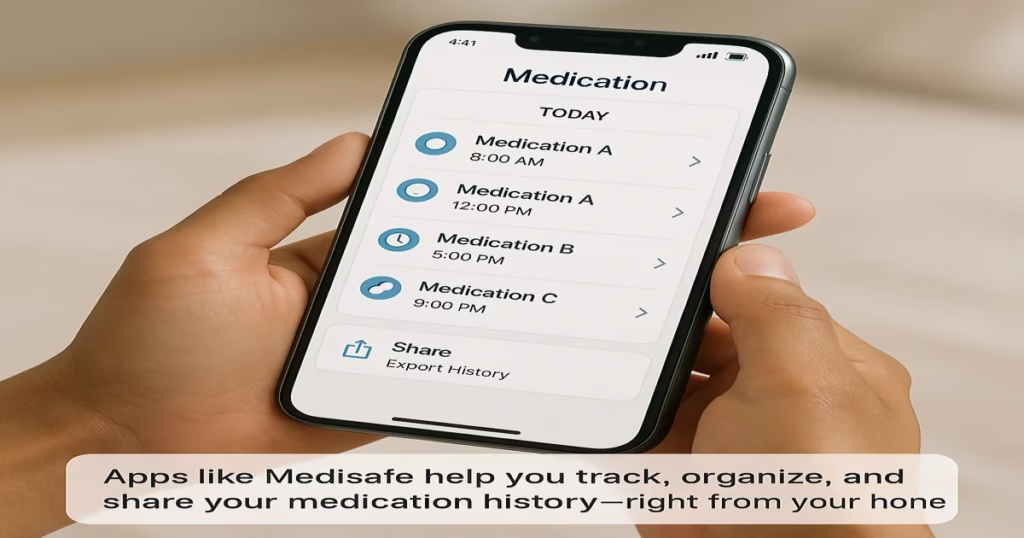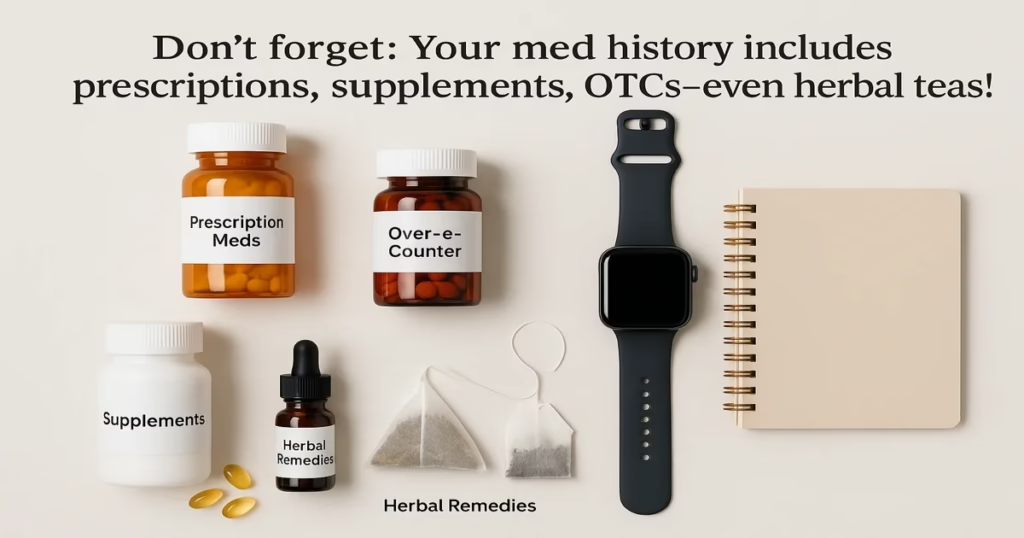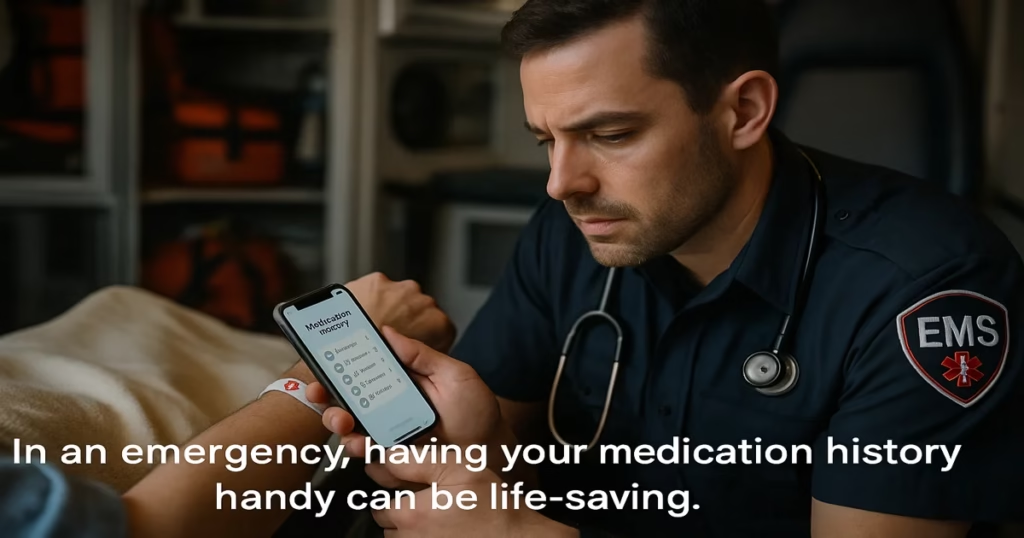Ever been to the doctor and they ask, “What meds are you on?” and you’re like, “Uh, that one pill for my allergies… and something else?” Yeah, we’ve all been there. That’s where medication history comes in—it’s like your personal health GPS. It tracks every pill, shot, cream, or supplement you’ve used over time. This isn’t just about memory; it’s about safety. Your medication history helps doctors. It helps them avoid dangerous drug interactions. Additionally, it aids in early detection of adverse effects and therapy selection. It can also prevent unnecessary prescriptions and reduce the risk of allergic reactions or complications.
So how do you stay on top of it? Start by keeping a simple log—either in a notebook, a health app, or even a note on your phone. Include the name of the medication, the dosage, why you’re taking it, and how long you’ve been using it. Bring it with you to every appointment. Trust me, your future self—and your healthcare team—will thank you. Think of this like a quick coffee chat about smarter ways to manage your health, kind of like when you’re casually discussing Fun Psychology Questions that make you reflect deeper than expected. Tracking your meds may seem small, but it can make a massive difference in how your doctors care for you. Ready to take charge of your health? Let’s get into it!

What Is Medication History, Anyway?
So, what’s medication history? It’s a detailed record of all the medications you’ve taken—past and present. We’re discussing prescriptions, OTC drugs, supplements, vitamins, and that herbal tea your aunt loves. It includes stuff like the drug name, dose, how long you took it, why you took it, and any side effects. Sounds like a lot, right? But it’s super important for keeping your healthcare on point.
Here’s what a solid medication history covers:
- Prescription Meds: Like antibiotics, blood pressure pills, or antidepressants.
- OTC Drugs: Think ibuprofen, allergy meds, or antacids you grab at the pharmacy.
- Supplements and Vitamins: Fish oil, vitamin D, or that trendy turmeric capsule.
- Herbal Remedies: Any natural stuff, like echinacea or CBD oil.
- Past Treatments: Meds you took years ago, even if you’re off them now.
- Side Effects or Allergies: Reactions like rashes or nausea tied to specific drugs.
A complete medication history is like a cheat sheet for your doctor. It helps them make better choices about your care. Let’s explore why it’s such a big deal.
Why Does Medication History Matter?
You might be thinking, “Why bother keeping track of every pill I’ve popped?” Great question! Your medication history is like the backstory to your health—it helps doctors, pharmacists, and even you make smarter choices. Here’s why it’s a must-have in 2025:
- Prevents Dangerous Mixes: Some drugs don’t play nice together. For instance, combining some antidepressants and painkillers can lead to serious issues. Your medication history flags these risks.
- Avoids Allergies: If you had a bad reaction to penicillin back in the day, your doctor needs to know to avoid prescribing it again.
- Guides Treatment: Knowing what you’ve tried (and what worked or didn’t) helps doctors pick the best meds for you now.
- Saves Time: No more guessing games at appointments. A clear medication history speeds things up.
- Enhances Safety: Pharmacists use it to double-check prescriptions. This helps catch errors before they reach you.
- Tracks Patterns: It can show if you’re overusing OTC meds or if a chronic condition needs a new approach.
In a world where healthcare is getting more personalized (think AI-driven diagnostics in 2025), your medication history is the foundation for tailoring treatments to you.
Who Uses Your Medication History?
Your medication history isn’t just for you—it’s a team effort. Here’s who relies on it:
- Doctors: To prescribe safely and avoid drugs that didn’t work for you before.
- Pharmacists: To check for drug interactions or allergies when filling your scripts.
- Nurses: To monitor side effects or changes during hospital stays.
- You: To stay on top of your health and make informed choices.
- Emergency Teams: In a crisis, like an ER visit, your medication history can be a lifesaver.
Think of it like a shared Google Doc for your health. For everything to function properly, everyone must have access.
How to Build and Track Your Medication History
Okay, so how do you create a solid medication history? It’s easier than it sounds, and you don’t need to be a tech wizard. To help you get started, below is a detailed guide:
- Gather Your Meds:
- Look in your medicine cabinet for any current prescriptions, OTC drugs, and supplements.
- Note down names, dosages (like 10 mg), and how often you take them (daily, as needed).
- Include past meds you remember, even if you stopped years ago.
- Talk to Your Pharmacy:
- Most pharmacies keep your prescription records for 1 to 2 years.
- Ask for a printout or digital copy of your fill history.
- Check Medical Records:
- Call your doctor’s office or hospital to get your past prescriptions.
- Many patient portals (like MyChart) let you download this info.
- Use a Template:
- Create a simple list or spreadsheet with columns for:
- Drug name
- Dose
- Purpose (e.g., “for high blood pressure”)
- Start/end dates
- Side effects
- Prescribing doctor
- Create a simple list or spreadsheet with columns for:
- Go Digital:
- Apps like Medisafe or MyTherapy let you track your medication history on your phone.
- Some EHR systems (like Epic) sync with pharmacies for automatic updates.
- Update Regularly:
- Add new meds or changes (like dose adjustments) as they happen.
- Review every 3–6 months or before big doctor visits.
Pro tip: Keep a physical copy in your wallet or a digital version on your phone for emergencies. It could save the day!

Common Mistakes to Avoid with Medication History
Even the best of us mess up sometimes. Here are some pitfalls to dodge when managing your medication history:
- Forgetting OTC Meds: That daily ibuprofen counts—don’t skip it!
- Vague Details: “I took a blue pill for my heart” won’t cut it. Include specifics like name and dose.
- Not Updating: If you stop or start a med, update your list ASAP.
- Ignoring Supplements: Herbal stuff can interact with meds, so include it.
- Assuming Doctors Know: Your GP might not know what your specialist prescribed. Share your medication history with everyone.
Avoiding these keeps your record accurate and useful.
How Medication History Saves the Day in Real Life
Let’s get real—medication history isn’t just paperwork; it can make or break your health. Here are some scenarios where it shines:
- ER Visits: Imagine you’re in an accident and can’t talk. Paramedics check your medication history. They see you’re allergic to some painkillers. Crisis averted.
- New Doctor: Switching providers? Your history helps them understand your health without starting from scratch.
- Chronic Conditions: For stuff like diabetes or asthma, tracking what meds worked (or didn’t) helps fine-tune your treatment.
- Traveling: Going abroad? A clear medication history ensures you get the right refills or emergency care.
In 2025, telehealth is booming. Now, 40% of visits are virtual. So, sharing your medication history online is simpler than ever.

Tech Tools to Supercharge Your Medication History
We’re in the future, folks! Tech makes tracking your medication history a breeze. Here are some tools to try in 2025:
- Medisafe: A free app for iOS and Android that reminds you to take meds and logs your history.
- MyTherapy: Keeps track of medications, symptoms, and doctor visits. You can also export reports.
- GoodRx: Not just for price comparisons—it can store your prescription history.
- Patient Portals: Tools like Epic or Cerner let you see and share your medication history with your providers.
- Smartwatches: Devices like Apple Watch or Fitbit can ping you for med reminders and sync with health apps.
Bonus: Some AI health apps, like those in X posts, can check your medication history for possible interactions. That’s pretty cool, right?
Tips for Sharing Your Medication History Safely
Your medication history is personal, so handle it with care. Here’s how to share it smartly:
- Bring It to Appointments: Have a printed or digital copy ready for doctors and pharmacists.
- Use Secure Portals: Share via encrypted patient portals, not email or unsecure apps.
- Update Providers: Tell every doctor, dentist, or specialist about changes to avoid mix-ups.
- In Emergencies: Keep a card in your wallet with key details (allergies, current meds) or use a medical ID app.
- Be Honest: Don’t hide supplements or drugs. Being open can save lives.
Why Medication History Is a 2025 Must-Have
In 2025, healthcare’s all about precision and prevention. Your medication history is the key to unlocking better care, especially with:
- AI in Healthcare: AI tools (like those from xAI) use your history to predict risks or suggest treatments.
- Telehealth Growth: Virtual visits rely on accurate records to avoid errors.
- Personalized Medicine: From gene-based therapies to custom drug plans, your history guides the way.
- Aging Population: With 20% of the US over 65 (per 2023 stats), tracking meds is critical for seniors.
Also, drug costs are rising by 5% each year, according to recent reports. So, knowing your history can help you and your doctor find affordable options.
Challenges and How to Overcome Them
Keeping a medication history isn’t always smooth sailing. Here’s what might trip you up and how to handle it:
- Memory Gaps: Forgot what you took five years ago? Request historical documents from your doctor or drugstore.
- Multiple Providers: Seeing different specialists? Use an app to centralize your history.
- Time Crunch: Too busy to update? Set a monthly reminder or use auto-syncing apps.
- Privacy Worries: Concerned about data leaks? Stick to HIPAA-compliant tools like Medisafe or patient portals.
With a little effort, these hurdles are no match for a solid medication history.
Fun Facts About Medication History
To keep things light, here are some cool tidbits about medication history:
- Ancient Roots: Even ancient Egyptians kept records of herbal remedies on papyrus.
- Digital Boom: Over 50% of US hospitals now use electronic health records (EHRs) to track meds, per 2023 data.
- Error Reduction: Accurate histories cut medication errors by up to 30%, says a 2022 study.
- Global Impact: WHO’s 2025 health goals push for better medication tracking worldwide.
How to Get Started Today
Ready to take control of your medication history? Here’s a quick plan:
- Collect Your Info: Gather all of your prescription receipts, supplement labels, and medication bottles.
- Make a List: Use a notebook, spreadsheet, or app to jot down details.
- Talk to Your Team: Ask your doctor or pharmacist for any missing records.
- Go Digital: Download Medisafe or MyTherapy to keep it all in one place.
- Share It: Bring your history to your next appointment. It can be uploaded to your patient site as well.
Start small—you don’t need every detail from the past decade. Even a basic list is a huge step forward.

Final Thoughts: Own Your Medication History
So, why bother with medication history? It’s your ticket to safer, smarter healthcare. Keeping a clear record helps you stay safe from risky drug combinations. It also helps your doctor create the right treatment plan. In 2025, tech like AI and telehealth is changing the game. It’s now easier and more vital to keep your medication history current. Whether you’re managing a chronic condition or just taking a daily vitamin, this is one habit worth building.


